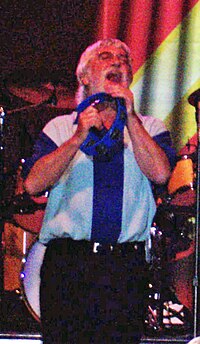Graeme Edge
| Graeme Edge | |
|---|---|

Graeme Edge in 2007.
|
|
| Background information | |
| Birth name | Graeme Charles Edge |
| Born |
30 March 1941 Rocester, Staffordshire England, United Kingdom |
| Genres | |
| Occupation(s) | |
| Instruments | |
| Years active | 1964–present |
| Labels | |
| Associated acts |
|
| Website | www |
| Notable instruments | |
| Gretsch Drums | |
Graeme Charles Edge (born 30 March 1941) is an English musician and multi-instrumentalist best known as the drummer and a songwriter for the English band, The Moody Blues. Edge is the only remaining original member of The Moody Blues still performing in the band. In addition to his work with the Moody Blues, Edge has worked as the bandleader of his own outfit, the Graeme Edge Band. He has contributed his talents to a variety of other projects throughout his career. He currently resides on the waterfront in Bradenton, Florida.
One of the original members of The Moody Blues, drummer Edge provided a foundation for the original R&B and rock flavoured band fronted by Denny Laine, playing on all their Decca singles including the UK chart topping "Go Now" (January 1965), and other 1965 hit songs; "I Don't Want To Go On Without You", "Everyday", and "From The Bottom of my Heart (I Love You)", which were additionally released in that year.
After the departure of Denny Laine and bassist Clint Warwick and the later recruitment of Justin Hayward and John Lodge in 1966 the band continued initially to play the R&B style material, however after an irate fan dismissed their concert performance as poor, Edge is quoted as speaking up to say to his bandmates: "That guy was right...we WERE rubbish!" leading the band to decide henceforth to drop the blues style covers and begin writing and recording their own songs only.
Edge initially was a poet for the band contributing "Morning Glory" and "Late Lament" to Days of Future Passed in 1967 (narrated by Mike Pinder). Edge himself opened In Search of the Lost Chord (1968) with his brief poem "Departure" though Pinder again narrated his "The Word" poem later on that set. Further poems provided by Edge included "In The Beginning" (co-narrated by Hayward, Edge and Pinder in turn), and "The Dream" (spoken by Pinder) for On The Threshold of A Dream (1969). Edge says that the reason why most of his poetry was recited by Pinder was because he smoked so many cigarettes and drank so much whisky that he had the best voice for it.
...
Wikipedia
